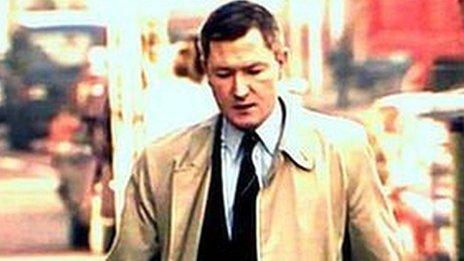Pat Finucane inquiry decision an 'insult' to family
- Published
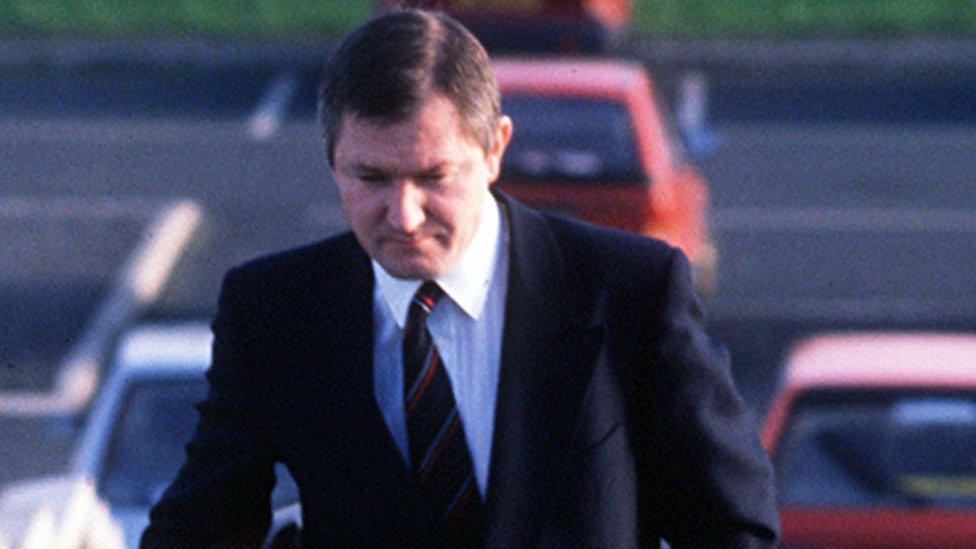
Senior figures in four Stormont parties have urged the government to reconsider a decision not to hold a public inquiry into the murder of Pat Finucane.
Sinn Féin, the SDLP, Alliance and the Green Party sent a joint letter to NI Secretary Brandon Lewis.
On Monday, Mr Lewis said a public inquiry into the lawyer's murder would not take place at this time.
Mr Finucane was shot dead by loyalist paramilitaries from the Ulster Defence Association (UDA) in February 1989.
The letter describes the government's decision as an "insult" to the Finucane family.
It adds that it is "neither a credible nor tenable position".
The letter - signed by Sinn Féin Deputy First Minister Michelle O'Neill, SDLP leader Colum Eastwood, Alliance Party deputy leader Stephen Farry and Green Party leader Claire Bailey - insists a public inquiry is the most effective option to reveal the truth around state collusion in the murder.
Mr Lewis said he had taken the decision due to other review processes needing to run their course.
Those include a review of the case by the Police Service of Northern Ireland and further investigation by the Police Ombudsman.
'Case prioritisation'
The Police Ombudsman has said issues related to Pat Finucane's murder which have not yet been investigated by it will progress "when resources allow".
In a statement, the Ombudsman said that "at this stage events connected to the murder of Pat Finucane are not central to any of our ongoing investigations".
It said there were 13 matters identified during a previous review and that it had decided to include those in ongoing relevant investigations where possible:
Two of those have been looked at as part of a broader enquiry into a number of loyalist attacks in south Belfast in the 1990s
Others have been included in a major investigation about police conduct in relation to UDA activity
The remaining issues are to be progressed as standalone cases
The statement added that the cases would be assessed using their "case prioritisation policy".
The ombudsman said: "Those matters which have not progressed to investigation at this stage will be advanced when resources allow."
Mr Lewis said the PSNI also intends to begin a process of review into the murder of Mr Finucane early next year.
This was an important development and a factor in determining the next steps in the case, he said.
PSNI Chief Constable Simon Byrne said it was his organisation's view, external that there were "currently no new lines of inquiry", and it would now determine if a further review was merited given previous investigations.
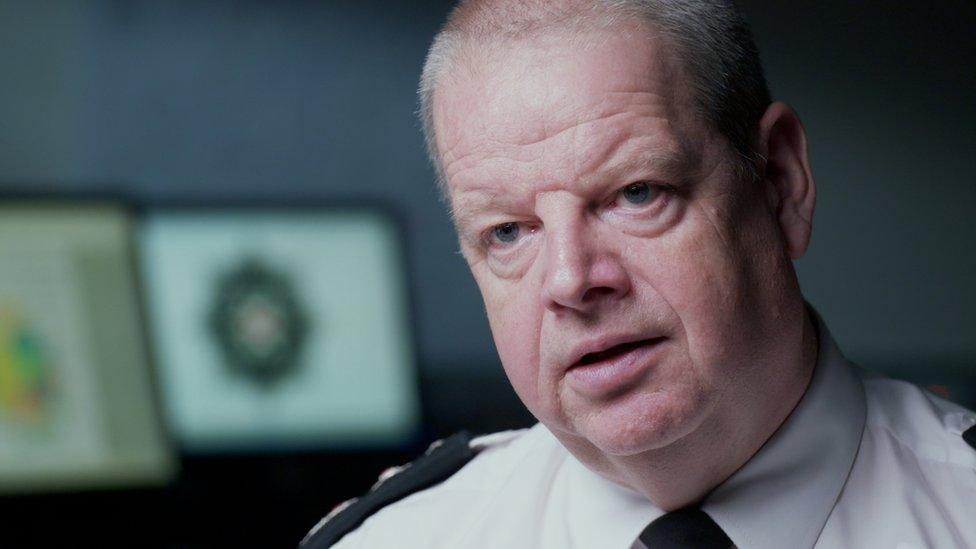
Chief Constable Simon Byrne has said any further reviews by the PSNI will need to be conducted independently
Any review would need to be conducted independently, he added.
Mr Byrne said: "A review itself is not an investigation. Any decision to investigate would only be made following the review process."
The government said it will determine at the end of these current processes whether further investigation would be required, to ensure it has complied with its legal obligations.
Pat Finucane's son John, the Sinn Féin MP for North Belfast, said he and his family would continue to campaign for an inquiry and that he may look for support from United States President-elect Joe Biden.
"When he was then Senator Biden, as chair of the Senate Foreign Relations Committee, he supported our calls for an inquiry," Mr Finucane said on the BBC's Good Morning Ulster programme.
"I appreciate that he is going into arguably the busiest role on the planet, so we aren't blind to that.
"But President-elect Biden has already shown a clear interest in Irish affairs, he has history in supporting our campaign and I think that America has always had a significant role to play in our peace process, certainly in our campaign."
Taoiseach (Irish PM) Micheal Martin has criticised the failure to order an inquiry and also indicated that he would raise the issue with Mr Biden.
But DUP MP for East Londonderry Gregory Campbell said any proposals for an inquiry should have been dismissed entirely by Mr Lewis.
"The chief constable of the police has indicated that there are no new lines of inquiry," Mr Campbell said.
"I think most people would say, well that's hardly a surprise is it, 31 years after the event?
"I think he [Mr Lewis] should have ruled it out and said there is no purpose to be served by a public inquiry and if he hasn't done it now, hopefully he can bring himself to do it next year."
The Labour party says it predicts the Supreme Court will step in to force the government to call a public inquiry if it doesn't overturn Monday's decision.
Shadow Secretary of State for Northern Ireland, Labour MP Louise Haigh, said an inquiry should have happened under the last Labour government.
She said the party was "committed" to holding an inquiry if it won a future general election.
"We are clear that it is the only legal and moral way to deal with this case," she added.
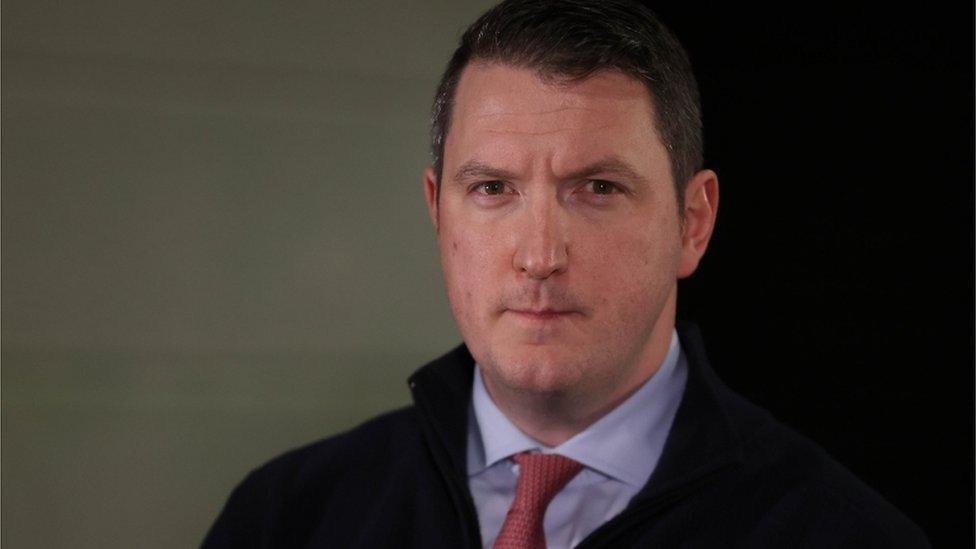
Pat Finucane's son John is Sinn Féin MP for North Belfast
Speaking in the assembly on Tuesday, Sinn Féin's John O'Dowd said state collusion in Mr Finucane's murder should "concern everyone" in the assembly, regardless of their views on dealing with the past.
But DUP MLA Paul Givan said pain had been "felt by families right across Northern Ireland" when it came to losing loved ones during the Troubles.
"Many of those families had a mere desktop exercise carried out by the Historical Enquiries Team," he said.
SDLP MLA Dolores Kelly said it was "disingenuous" for some to argue that the family had turned down the previous offer of a public inquiry.
"The 2005 public inquiries act was brought into legislation to give the secretary of state undue influence in terms of any inquiry - the British government has failed miserably," she said.
Ulster Unionist MLA Doug Beattie said there were "no winners and losers", but said thousands of victims were still waiting on truth and justice, and the debate should not have been used as an "opportunity to hurl insults" across the assembly chamber.
TUV leader Jim Allister said he acknowledged the pain felt by the Finucane family, but said the "deficit was staggering" when compared to how other legacy investigations had been handled.
Alliance's John Blair said the government's "foot-dragging" on the matter suggested institutional resistance to allowing full discovery of the facts in the case.
- Published30 November 2020
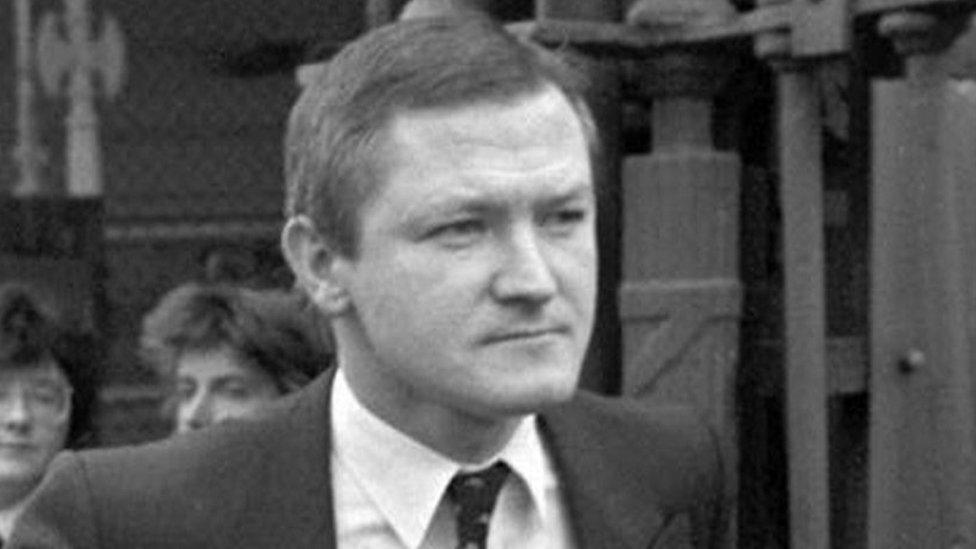
- Published7 October 2019
